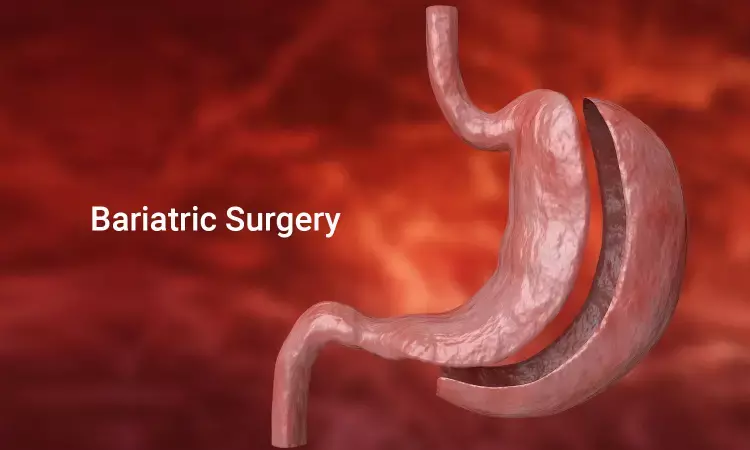- Home
- Medical news & Guidelines
- Anesthesiology
- Cardiology and CTVS
- Critical Care
- Dentistry
- Dermatology
- Diabetes and Endocrinology
- ENT
- Gastroenterology
- Medicine
- Nephrology
- Neurology
- Obstretics-Gynaecology
- Oncology
- Ophthalmology
- Orthopaedics
- Pediatrics-Neonatology
- Psychiatry
- Pulmonology
- Radiology
- Surgery
- Urology
- Laboratory Medicine
- Diet
- Nursing
- Paramedical
- Physiotherapy
- Health news
- Fact Check
- Bone Health Fact Check
- Brain Health Fact Check
- Cancer Related Fact Check
- Child Care Fact Check
- Dental and oral health fact check
- Diabetes and metabolic health fact check
- Diet and Nutrition Fact Check
- Eye and ENT Care Fact Check
- Fitness fact check
- Gut health fact check
- Heart health fact check
- Kidney health fact check
- Medical education fact check
- Men's health fact check
- Respiratory fact check
- Skin and hair care fact check
- Vaccine and Immunization fact check
- Women's health fact check
- AYUSH
- State News
- Andaman and Nicobar Islands
- Andhra Pradesh
- Arunachal Pradesh
- Assam
- Bihar
- Chandigarh
- Chattisgarh
- Dadra and Nagar Haveli
- Daman and Diu
- Delhi
- Goa
- Gujarat
- Haryana
- Himachal Pradesh
- Jammu & Kashmir
- Jharkhand
- Karnataka
- Kerala
- Ladakh
- Lakshadweep
- Madhya Pradesh
- Maharashtra
- Manipur
- Meghalaya
- Mizoram
- Nagaland
- Odisha
- Puducherry
- Punjab
- Rajasthan
- Sikkim
- Tamil Nadu
- Telangana
- Tripura
- Uttar Pradesh
- Uttrakhand
- West Bengal
- Medical Education
- Industry
Indications for metabolic and bariatric surgery: Key takeaways from ASMBS guideline

USA: The American Society for Metabolic and Bariatric Surgery (ASMBS) and the International Federation for the Surgery of Obesity and Metabolic Disorders (IFSO) have issued a joint statement on the currently available scientific information on metabolic and bariatric surgery and its indications.
The guideline, published in the Surgery for Obesity and Related Diseases is an update to the statement on gastrointestinal surgery for severe obesity released by the National Institutes of Health (NIH) thirty years ago by convening a Consensus Development Conference. The 1991 NIH Consensus Statement has been used by providers, hospitals, and insurers, as a standard for selection criteria for bariatric surgery. A body mass index (BMI) ≥40 kg/m2, or BMI ≥35 kg/m2 with co-morbidities, is a threshold for surgery that is applied universally.
Since the publication of the 1991 NIH Consensus Statement, hundreds of studies have been published on the worldwide obesity epidemic and global experience with metabolic and bariatric surgery (MBS), which has greatly enhanced the understanding of obesity and its treatment.
The guideline was released in light of significant advances in the understanding of the disease of obesity, its management in general, and metabolic and bariatric surgery.
Given below are the major updates to the 1991 National Institutes of Health guidelines for bariatric surgery
- The authors recommend metabolic and bariatric surgery (MBS) for individuals with a body mass index (BMI) ≥35 kg/m2, regardless of the presence, absence, or severity of co-morbidities.
- MBS should be considered for individuals with metabolic disease and a BMI of 30-34.9 kg/m2.
- BMI thresholds should be adjusted in the Asian population such that a BMI ≥25 kg/m2 suggests clinical obesity, and individuals with BMI ≥27.5 kg/m2 should be offered MBS.
- Long-term results of MBS consistently demonstrate safety and efficacy.
- Appropriately selected children and adolescents should be considered for MBS.
"Consultation with a multidisciplinary team can help in the management of the patient's modifiable risk factors with a goal of reducing risk of perioperative complications and improving outcomes," the authors wrote. "The ultimate decision for surgical readiness should be determined by the surgeon."
They concluded by saying that, "severe obesity is a chronic disease requiring long-term management after primary MBS. This may include revisional surgery or other adjuvant therapy to achieve desired treatment effect."
They noted that MBS is an effective treatment of clinically severe obesity in patients who need other specialty surgery, such as joint arthroplasty, abdominal wall hernia repair, or organ transplantation.
Reference:
Eisenberg D, Shikora SA, Aarts E, Aminian A, Angrisani L, Cohen RV, De Luca M, Faria SL, Goodpaster KPS, Haddad A, Himpens JM, Kow L, Kurian M, Loi K, Mahawar K, Nimeri A, O'Kane M, Papasavas PK, Ponce J, Pratt JSA, Rogers AM, Steele KE, Suter M, Kothari SN. 2022 American Society for Metabolic and Bariatric Surgery (ASMBS) and International Federation for the Surgery of Obesity and Metabolic Disorders (IFSO): Indications for Metabolic and Bariatric Surgery. Surg Obes Relat Dis. 2022 Oct 18:S1550-7289(22)00641-4. doi: 10.1016/j.soard.2022.08.013. Epub ahead of print. PMID: 36280539.
Dr Kamal Kant Kohli-MBBS, DTCD- a chest specialist with more than 30 years of practice and a flair for writing clinical articles, Dr Kamal Kant Kohli joined Medical Dialogues as a Chief Editor of Medical News. Besides writing articles, as an editor, he proofreads and verifies all the medical content published on Medical Dialogues including those coming from journals, studies,medical conferences,guidelines etc. Email: drkohli@medicaldialogues.in. Contact no. 011-43720751


